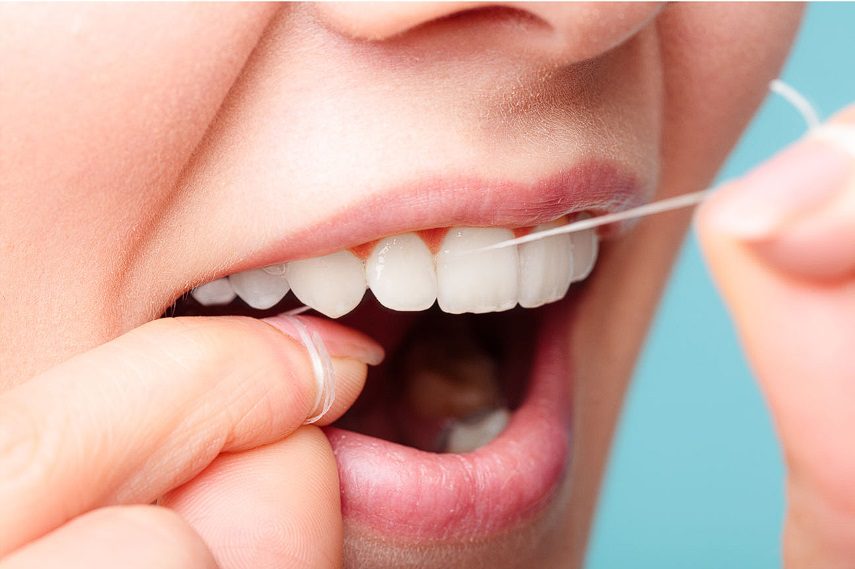You probably know regular flossing keeps your smile sparkling, but did you know it might also play a crucial role in ischemic stroke risk reduction? Ischemic strokes, which occur when the brain doesn't get enough blood due to a blockage, are serious health events. It's an unexpected yet compelling connection that we take seriously at Lewis Estates Dental Centre. Our commitment to your health extends beyond just your teeth and gums. We're excited to share the latest findings on how this simple daily habit of regular flossing can contribute to a significant ischemic stroke risk reduction, aligning with our holistic approach to your well-being.

The Science Behind Flossing & Cardiovascular Health: It's More Connected than You Think
Did you know that regular flossing isn't just about a brighter smile? It actually plays a significant role in your cardiovascular health by leading to inflammation reduction throughout your body. Think of it this way: keeping your mouth clean helps keep your heart happy! A major study called ARIC (Atherosclerosis Risk in Communities) tracked thousands of adults for years. The surprising finding? Consistent regular flossing was linked to a lower chance of heart problems, even when other health factors were considered. This shows that by tackling harmful oral bacteria and achieving systemic inflammation reduction, regular flossing is a small habit with big potential for your heart and blood vessels. Effective plaque removal through flossing is key—it cuts off the source of trouble!
How Does Dental Plaque Cause Inflammation?
That soft, sticky film you sometimes feel on your teeth is dental plaque. It's teeming with bacteria, and if left undisturbed, it can cause inflammation. These sneaky oral pathogens trigger gum disease inflammation. It's like your gums are sending out an alarm because they're irritated by the bacteria. Over time, this ongoing gum disease inflammation allows those dental plaque bacteria and their nasty byproducts to sneak into your bloodstream entry. Once they're circulating, these oral pathogens can crank up the levels of inflammatory markers in your body, like CRP and IL-6. These inflammatory markers contribute to systemic inflammation, which can impact all sorts of areas, including your precious cardiovascular health. So, tackling that plaque with regular flossing is a vital step in keeping inflammation at bay!

Research Results Linking Flossing to Lower Stroke Occurrence: The Numbers Speak
Groundbreaking research findings from the University of South Carolina shed light on the powerful connection between oral care and brain health. This controlled study revealed a significant statistical relationship showing that individuals who reported regular flossing had a notable stroke risk reduction. What's truly compelling is that researchers carefully accounted for other factors like age, gender, smoking habits, and overall health practices. This meticulous approach strengthens the evidence suggesting that regular flossing offers an independent benefit in ischemic stroke prevention, highlighting the importance of this simple daily habit.
What Makes Cardioembolic Strokes Different from Other Types?
The University of South Carolina study delved into different stroke subtypes, revealing that flossing reduces ischemic stroke, particularly those classified as cardioembolic stroke mechanisms. Unlike other ischemic strokes caused by plaque buildup in blood vessels, cardioembolic stroke mechanisms involve blood clot formation in the heart that travels to the brain. Often, these clots are linked to heart rhythm issues like atrial fibrillation. The study suggests that the flossing inflammation reduction may specifically impact the pathways leading to these heart-related clots, making regular flossing a valuable tool in cardioembolic stroke prevention. Understanding this stroke classification underscores the far-reaching impact of oral hygiene.

Flossing's Unique Role in Preventing Atrial Fibrillation: A Surprising Link
Intriguingly, research suggests that flossing's independent benefits extend to atrial fibrillation prevention, a heart rhythm disorder that significantly elevates stroke risk factors. This means that even if you brush diligently, regular flossing offers an additional layer of protection. The oral-cardiac connection is believed to stem from gum inflammation; chronic inflammation in the mouth can contribute to heart rhythm irregularities, increasing the likelihood of atrial fibrillation and subsequent stroke. Therefore, regular flossing stroke risk reduction may, in part, be due to its specific impact on this critical heart condition.
Why Is Flossing More Effective Than Brushing Alone? The Gap Brushing Misses
Think of your toothbrush—it does a great job on the broad surfaces of your teeth, but it has brush limitations when it comes to interdental cleaning. Between-teeth plaque thrives in these tight spaces, leading to persistent gum inflammation reduction that brushing alone can't fully address. Studies on comparative effectiveness consistently show that adding regular flossing to your routine provides significant additional benefits in removing this stubborn plaque and reducing inflammation compared to brushing alone. This thorough interdental cleaning is key to minimizing the inflammatory cascade that can impact your overall health.

The Dose-Response Relationship in Flossing Frequency: More Often, More Benefit
Interestingly, research indicates dose-dependent benefits when it comes to flossing frequency and regular flossing stroke risk reduction. This means the more consistently you floss, the greater the potential for protection against stroke. Studies suggest that daily flossing is significantly more effective than occasional flossing in achieving optimal oral hygiene and maximizing these preventative health practices. Think of it as building a stronger shield against inflammation and its potential systemic effects—consistency is key!
How Often Should You Floss for Maximum Stroke Protection? Aim for Daily
Based on research findings and recommendations from dental authorities, the ideal flossing routine for maximum daily flossing benefits is, as the name suggests, every day. Making daily flossing a non-negotiable part of your routine, just like brushing, helps maintain a low level of oral bacteria and inflammation. For successful habit formation, try flossing at the same time each day (e.g., before bed). Consistent preventative health practices, including consistent practice of daily flossing, are your best defence. Even a few minutes of daily flossing can help you cross a significant preventative threshold.
Demographic Differences in Flossing Habits and Stroke Risk: Who's Missing Out?
Did you know that who you are and where you live can actually impact how often you floss—and therefore, your potential stroke risk? The University of South Carolina study hinted at interesting demographic differences in flossing patterns. This means some groups might be less likely to floss regularly, leading to potential health disparities in stroke prevention. Think about it: if access to dental care is limited due to rural healthcare access or other factors, preventative care adoption, like consistent regular flossing, can take a backseat. Recognizing these demographic differences is the first step in making sure everyone benefits from the regular flossing stroke risk reduction.
Which Population Groups Could Benefit Most from Regular Flossing? Let's Reach Them!
The study likely pointed to underserved populations and those in areas with limited rural healthcare as groups where flossing patterns might be lower. Factors like socioeconomic factors can create barriers to consistent preventative care access, including something as simple as buying floss. That's why targeted health education that's easy to understand and accessible is so important for boosting regular flossing habits in these communities. By focusing on preventative care access and breaking down barriers, we can help everyone unlock the flossing health benefits and work towards better health equity.

Practical Flossing Techniques for Stroke Risk Reduction: Your Simple Steps to Success
Want to get the most out of your regular flossing for maximum flossing inflammation reduction? It's easier than you think! Imagine gently guiding the floss between your teeth, giving each tooth a little hug by curving the floss into a "C" shape. Then, think of it as wiping away the bad stuff with a gentle up-and-down motion, even just a tiny bit under your gums. There are all sorts of flossing tools out there—the classic string, handy floss picks, and even water flossers—so find the one that feels right for you and makes effective oral hygiene a breeze. During your dental check-ups in our West Edmonton clinic, we can help you choose the best flossing method for your specific needs (and we are accepting new patients in 2025 and 2026). The key is that interdental cleaning—getting into those tight spaces—is what really counts. If regular floss feels like a wrestling match, don't give up! Flossing alternatives can be lifesavers, just remember that good technique is always your winning move.
Your Quick Guide to Flossing Like a Pro:
- The "C" Hug: Curve the floss gently around the side of each tooth, forming a "C" shape.
- The Up-and-Down Wipe: Clean the tooth surface with gentle up-and-down movements.
- Explore Your Tools: Find flossing tools you like and will use consistently.
- Focus on the Gaps: Interdental cleaning is where the magic happens!
- Don't Give Up: If regular floss is tricky, try flossing alternatives with good technique.
Which Flossing Products Work Best for Different Dental Needs? Let's Find Your Perfect Match
Just like finding the right toothbrush, the world of floss types offers something for everyone! Good old standard floss is like the reliable best friend—affordable and gets the job done for most. Water flossers can feel like a mini spa treatment for your gums and are great at blasting away food bits, though they might not scrub away plaque as well as the string. Floss picks are handy options when you're out and about, but their design might limit how closely they clean around the tooth. Got wider spaces? Interdental brushes are your heroes! If you've got braces or other special needs flossing situations, specialized floss or a water flosser with a special tip might be your best bet. And if sensitive gums are a concern, try gentle unwaxed floss or a water flosser on a low setting—comfort is key to consistency! The best floss types are the ones you'll actually use consistently for those amazing flossing health benefits.
Your Flossing Product Cheat Sheet:
- Standard Floss: The reliable and affordable classic.
- Water Flossers: Gentle and great for rinsing, but might not scrub as well as string.
- Floss Picks: Super convenient for quick flossing on the go.
- Interdental Brushes: Perfect for cleaning wider gaps between teeth.
- Specialized Floss/Water Flossers: Designed for special needs flossing like braces.
- Gentle Unwaxed Floss/Low-Setting Water Flossers: Kind to sensitive gums.

Simple String, Powerful Shield: Take Action for a Healthier You!
So, what's the bottom line? That little piece of floss you might overlook actually offers significant benefits for your health. The science is clear: regular flossing is an effective way to lower your stroke risk. Because flossing reduces ischemic stroke and supports fantastic dental flossing heart health, it's a real cornerstone of oral hygiene stroke prevention. Don't forget that flossing inflammation reduction brings those amazing independent benefits, and sticking to daily flossing is where you'll see the best results. Here at Lewis Estates Dental Centre, we know your oral health is a big piece of your overall well-being. Let's work together to make flossing a simple, effective habit for a healthier heart and a sharper mind!
Ready to make this small change for a big impact? Book your next check-up at Lewis Estates Dental Centre and let's create your personalized flossing game plan!
